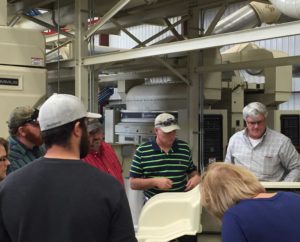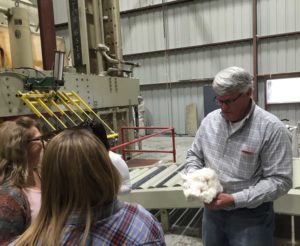
USDA employees toured Adobe Walls Gin in Hansford County, Texas, which is in the process of expanding with the construction of a second gin.
By Cassie Bable, Farm Service Agency Public Affairs Specialist
The Texas Panhandle, like the rest of the state, saw an increase in the number of acres planted to cotton this year due to the decline in grain prices. U.S. Department of Agriculture (USDA) employees across the panhandle took an even closer look at cotton production and processing when they toured Adobe Walls cotton gin in Spearman, Texas. Employees from the Farm Service Agency (FSA), Natural Resources Conservation Service (NRCS) and Soil and Water Conservation District (SWCD) visited with gin manager, Jerrell Key, about this year’s cotton crop and toured the facility.
Adobe Walls is in the process of expanding with the construction of a second gin. The existing gin is a state-of-the-art facility, but the new gin will have even more increased efficiency and room to grow. USDA employees walked through the new gin while Key explained the ginning process.
While touring the operational gin, employees saw firsthand the entire ginning process from cleaning the cotton to compressing the lint into bales that weigh approximately 500 pounds.
The growing season for cotton in the Texas Panhandle is shorter than other regions of the state, so quicker-maturing varieties are used. This means that the cotton is immature at harvest and requires more pre-cleaning to produce quality lint. The pre-cleaning area in the new gin is twice the size of the area in the existing gin.

Gin manager, Jerrell Key, explains how cotton bales are classified according to the quality of the cotton.
Employees watched as samples were taken from each cotton bale in order to classify it according to the quality of the cotton. This process takes many factors into consideration including the fineness, color, fiber strength, length and uniformity. The cotton bales are then shipped to the Amarillo Cotton Warehouse.
Just like other sectors of agriculture, the cotton industry has experienced change due to technology. Many farmers have transitioned to using cotton stripper balers, which produce round modules of cotton. Adobe Walls Gin is taking in about 70 percent round modules and 30 percent traditional modules.
The gin processes around 50 bales an hour on average. Key expects to finish ginning the 2017 cotton crop in March, 2018 .





